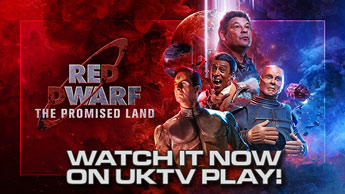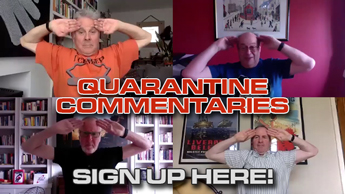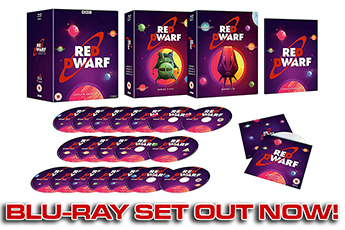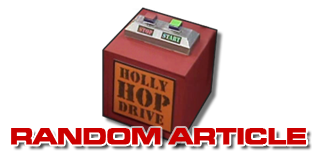 |
Doug Naylor: The Anniversary Interview The man in charge looks back over the last quarter century. |

Seb Patrick
In February 1988, Doug Naylor was a comedy writer known primarily for his work in radio, and as one of the head writers on the satirical puppet comedy show Spitting Image. Together with his then writing partner Rob Grant, he had just created a sci-fi sitcom called Red Dwarf, which was finally getting its debut airing on BBC2 some three years after first being commissioned.
Twenty-five years later, Red Dwarf's ten series have made Doug one of the foremost comedy writers in the country - and he shows no signs of wanting to give up working on what has become one of the longest-serving and most successful British comedy series of all time.
In honour of the show's silver anniversary, reddwarf.co.uk thought it was about time we sat down with the boss to have a lengthy chat about Red Dwarf's past, present and - yes - future...

Going all the way back to the very start, then - what were your realistic expectations for Red Dwarf when you and Rob began working on the series?
Well, the thing is, you've got to remember the context of how it came about, and also how we were feeling about our careers at the time. At that point, we'd been a bit successful, so we expected more success. We didn't know any better!
Although it had taken three years to sell Red Dwarf, I in particular was absolutely convinced it was going to be brilliant. Because I didn't think there was anything like it. There was nothing before that had used science fiction conventions to explore character comedy - Hitchhiker's hadn't really done that - and it seemed like a really interesting match.
We got really excited about it, as everyone knows, when we wrote it, and when we gave it to people like Paul Jackson and John Lloyd, we expected something really good to happen immediately. But three years went past, and it didn't! In the meantime, we'd been headhunted to Spitting Image, six shows into its run - we were given the brief that if viewing figures didn't double within the following six week period, the show would be taken off the air. But we also had carte blanche to completely change the format. It was a glorious opportunity.
So our time there was really successful, and as such when Red Dwarf was finally commissioned, we expected it to be a hit - up until the point where we wandered up to Manchester and started to look at the sets! And we started to worry, then, that it looked everything that I didn't want, which was mega-cheesy, so cheap... sets made out of wood, everything grey. It was supposed to look like a submarine, but as everyone knows, it just looked like grey wood!
How do you feel about those sets now, incidentally, looking back? You may have been keen to change them at the time, but equally there are plenty of fans out there who actually say they prefer that original look, and didn't like when the show became more "glossy"...
It's different maybe if you're there, and you can actually see that it's just grey wood, and looks like nothing other than grey wood - there's no texture, no definition. And then, one of the reasons things look "glossier" is because the cameras got better. And that's one of the blessings of the first series is the cameras weren't nearly as good - and if you look at some of the old classic BBC series, similarly, they just don't look very good.
We did get a lot of comments at the time saying "The sets are wobbly", and "Clearly it's got no budget", so it wasn't just us who thought that! And our concern was that we didn't want it to deflect away from the narrative - that's the thing, if it takes you out of the story, thinking about how cheap it looks. We wanted to be able to live in the story.
Then, of course, we had no audience - or half an audience, at least - and so we'd lassoed a load of people in the pub and brought them in... all in all, we did really get the impression that the whole thing was a bit "C-team". That this wasn't the "official" BBC, that we'd just snuck in...! There was a real anxiety that somehow, someone would arrive and go "Oi, this has been rejected three times, what the hell do you think you're doing here?" Which obviously was nonsensical, but we did feel slightly like that.
But then, one of the great moments was stepping into a lift with an extra in costume. And that was like "Oh my god, this is really going to happen!" Just the thrill of seeing an extra in costume...
Of course, it became quite apparent early on that things weren't going right, so we had to wheedle our way into the production, as it were, to make sure things got back on track. We'd very much been a huge part of Spitting Image, but in sitcoms the role of the writer was regarded nervously by producers and directors. Because they thought if you had the writer in rehearsal, all they'd do was say how you couldn't change anything, be a total pain in the arse, and then strop out if anything's cut!
On the other hand, we were the sort of people who, if we weren't sure something really worked, we would go away and rewrite it. But they didn't know we were like that until they met us! So our role evolved throughout the series.
There was one anxious moment for me, where I was complaining about there not being enough detail on the set, and the production designer was there. He asked what I thought, and I was really just thinking out loud, saying there should maybe be some shelves here, a mirror there, and so on. So I then went back to the gallery, and Ed Bye asked loudly, "What's the production designer doing there?" And he was building my bloody shelves! Of course, I couldn't just say that I'd told him to build some shelves...!
Another thing which amused me was Paul Jackson being quite outraged at the idea of my wanting to reshoot all of Cat's stuff from The End. I didn't think it had worked that well, but now that we'd worked with Danny a while longer, I thought we could make it work better. But Paul thought it was like cheating in an exam - he couldn't see why we would want to go back and redo anything from the first show. But we did, and it was better!
So with all of that, why do you think the show took off the way it did?
Well, the first reviews were actually terrible. And the reviews were mostly just based on the trailer - they basically bitched about how it was just spacemen bickering about meaningless things. But in the end, there was clearly that audience who wanted to watch it - because I think it was about five million watched the first episode. Now true, it went down from five million all the way down to about two by show six, but still!
And then we asked the BBC not to repeat it, because we thought we could do the second series much better. Which actually turned out to be quite a clever move, although I can't imagine them doing that today...
That had an interesting effect further down the line, too -there seem to be a lot of fans who only saw those episodes for the first time during the 1994 repeat run, so it had a level of mystique around it...
Yes, and the video release of those first two series was delayed as well. That's why Series I sold so well, I think, because it was almost like the "banned" series. Not that we really thought of it that way at the time!
But then, Series II got good figures, and they repeated it, and it got identical figures, and so it was a hit. And then they couldn't really touch us whatever they thought of it, because we were getting the numbers.

Obviously, whenever there are changes made to the style of the show between series, we can usually see the production-based reasons for why they've happened. But aside from that, have you always felt a conscious need to keep things fresh, and not to rest on your laurels?
It's more a case of "What can we do that we haven't done before?" We don't ever want to repeat ourselves. And sometimes that involved changing the set, sure - but we wouldn't just decide to change the set just because it's a new series. And we weren't in a situation like with Blackadder, where they changed the characters and the location each time. We didn't want to do that. But I think we just wanted to keep it interesting.
Also, we were doing things in Series III that hadn't really been done before, and no-one around us knew enough to tell us that they were too difficult to attempt! That's what Paul Jackson said, at the end of that series. He also said it, to be fair, at the end of The Young Ones: "If we'd realised how complicated a lot of this was going to be, with the constraints of a studio and a sitcom budget, we wouldn't have bothered!"
But you do get carried away, you get excited about all these things that nobody else has done, nobody else has found out they're too difficult! So you go "Yeah! Animatronic Polymorph! Let's do it!" And of course, Peter Wragg and his team reckoned they could build anything, and would always say yes! But then you get into the thing, and you don't have the time to test it out, and so it's done on a wing and a prayer.
Do you think that constant evolution and experimentation is part of the show's lasting appeal?
Well, it certainly caused discussion, which in many ways is a good thing, because it keeps interest going. I think if it had been the same show every year... I mean, some shows, even classic shows, have a formula, and they repeat that formula. Reggie Perrin, for example, had a formula, they had the various recurring jokes, and each show went around and mopped them up.
Which is not to say that we don't have running gags, but we were always keen to try and write fresh stories. And in fact, when we did Cliché [Rob and Doug's 1981 radio sketch show], I remember meeting the comedy producer Geoffrey Perkins at a Christmas radio thing, and he said the problem with Cliché was that we didn't have any recurring characters. And I said we didn't do that because it felt like cheating! But he told us the audience couldn't identify with all the new sketches - we needed to have characters that the audience could identify with, and then it would be more successful.
And of course he was right, and so when we did Son of Cliché, we had recurring characters, and it was a lot better. So although we wanted to do fresh stories, we knew the importance of the recurring characters - but we wanted to put them in new situations each time.
Is there a particular instance you can recall where the reaction - of fans, or of an audience - to something had a genuine influence on your approach?
I remember "Back to Reality" when we recorded Timothy Spall's scene to utter stunned silence... we got absolutely nothing from the audience!
Was that just that people were taking in what was going on, rather than listening to the jokes...?
Well, that was my take on it! Rob went, "What the hell do we do?" But I said "Let's just do the whole scene all over again," and curiously, the second time they laughed, and it was fine.
But on those early series, we didn't really have a clue - we didn't get any feedback as writers. So we would write a series, and just assume nobody had noticed it! We weren't really people who'd read Broadcast, or pay attention to the ratings - it would just be based on the number of family members who'd call up at the end. And then you wouldn't really count the family members or friends anyway, because they're family members and friends! So you wouldn't really know.
And there was definitely a stage, in the early days - I think we both had it - of walking down the street in London, towards people we knew, and quite a lot seemed to cross the street! So that was our only real feedback on it...
Do you think of Red Dwarf as a science-fiction show with comedy in, or a sitcom with science fiction in?
I think... well, actually, you could argue, it's been both! Whether we intended that is something else...
It was always intended to be a comedy first. They were really so linked, but we had to pretend it wasn't science fiction when we sold it, because everyone said that science fiction didn't sell... and yet the science fiction part, from our point of view, was actually our pitch! Because otherwise, it was just about two guys in a spaceship. And especially with nobody else there, what was it going to be about? Just arguments about chicken soup dispensers, and skutters. So it was the science fiction tropes that gave it the impetus and the energy, and the originality. And also, the ability to go anywhere, get off the ship, whatever.
But I think if it's a science fiction show with comedy, that's probably when we've done it wrong. It should be the other way around.
It's very difficult to pin down a short description of exactly what Red Dwarf as a whole is, and what it's all about - every series sort of stands alone as its own thing. What would you say is a description of Red Dwarf that's true of the show as a whole, the elements that absolutely cannot change?
It's the four - or sometimes five - characters on a spaceship, trying to survive against the loneliness of a godless universe, and make sense of their lives.
Do you think - particularly with the way you've gone back to it with the more recent series after expanding the cast for Series VIII - that that sense of loneliness and isolation is important?
I think the loneliness is very important, and Series VIII did cause a fuss - but it wouldn't have caused a fuss if we'd done IX straight after it, and they'd been back to just being on their own. It was because it was seemingly the last series, and it was full of people, and that's ultimately not what Red Dwarf is really about.
From the beginning, I'd always been quite big on "Let's change everything each series", and Rob had been slightly less enthusiastic. But in retrospect now, and not being able to pull it back to where it should have been... that was a bit much for some people, I think.
Quite a famous feature of Red Dwarf over the years is the way the continuity, particularly series-to-series, doesn't always line up. Obviously to begin with this approach was a by-product of the way the show was made, but as it went on, did you find yourself embracing it a bit more? You even made jokes out of it in the novels and the later series...
There is a sort of in-joke going on there, that we're all aware of. And the way we kind of arrived at that was because basically, there were different people making Red Dwarf in the first series, and some of them thought that TV was basically trash, and you made it, and you threw it away, and then you'd do something else. And obviously, with Red Dwarf, we were making it because we felt it could be really special. But you've got to manoeuvre yourself into a situation where you've got some control of it, and that took a while - and so as it evolved, we were probably able to have more input into things like continuity.

Did you find it was more important to tell the best story possible at the time, rather than being concerned about whether it lined up with past backstory?
Absolutely, yeah. And in the end, the laugh is king - and Rob's feeling was certainly that if it works, it works, and don't worry about it.
Of the numerous celebrity fans the show has picked up over the years, are there any in particular you're most proud to have heard about?
Stephen Hawking! I'll take that. Anything anyone else might say about the show... Stephen Hawking likes it, so you're wrong!
Do you feel any differently about the show now that you're the sole writer and director, rather than having people like Rob, Ed Bye, Paul Jackson and so on involved?
No, because my role really hasn't changed - Paul Jackson would come in and suggest casting ideas, but very rarely did anything for the scripts. And Ed was very much a director, and didn't really have any input into the scripts until much later on. So it became quite apparent early on that we could kind of do what we wanted. And by Series II, I got myself into the edit, and I'd always be up in the gallery with Ed - Paul would rarely be there, even in the early days - giving him notes and thoughts throughout. And that's no different, really, from directing.
And equally on X, I'm not all alone creatively - Andrew's [Ellard, script editor] notes are fantastic, and Richard [Naylor, co-producer] had huge creative input across the board.
It's fair to say that at various points, you could quite reasonably have quietly stopped making Red Dwarf - after Rob left, after Series VIII, even after Back to Earth. What is it that keeps you coming back?
I do enjoy making it. It's the only opportunity I'll ever have of working with the four of them, again, as a team. And that's just so much fun, and we have such a bond there, that you don't want to give that up. And sure, I could do other series - and it's not like I don't want to do other series - but it's equally very attractive to work with the guys.
Do you feel a similar way about the characters, as well as the actors?
Oh yeah, absolutely. If the characters became boring, then no matter how much affection I've got for the cast, I wouldn't be able to do it. But thinking about all of them, I think there's still a lot that we can explore.
Can you actually pin down one single favourite episode, or is that too difficult?
See, the thing is, that's such a difficult question - because you can say "What's the best finished programme?" but then also, "What's my best contribution as a writer or director to a finished episode?" And then equally, you're looking for an episode where you just think, "That's great from top to bottom." And there isn't one - there isn't one where I just think I wouldn't change a word, wouldn't change a thing. I don't look at something like Back to Reality and think it's beyond absolutely anything else I could ever achieve. Because I still think it could be funnier.
So I can honestly say there isn't. I always think - or hope! - it's going to be the next one... which is maybe why I'm still doing it!
Compared with just writing, how much do you enjoy directing?
Oh, the directing's the fun bit! Oh, boy! There's no fun in the writing at all, apart from when you're doing, like, draft ten, and you suddenly find you've got that idea that's going to fix things. That's kind of fun. But mostly, it's like eating a large cardboard box: it's possible, you just have to eat a little bit every day!
Did you always want to direct?
Well, we directed Back to Reality and Quarantine, and I did have concerns at the time about whether that was a mistake. But both those shows were so straightforward - and also, when you've written it, you've seen the show once in your head, and you're able to talk to people and tell them very clearly what you want.
Whereas if there's a director involved, you've got to first convey that to him - and okay, you could argue that with a director, they're going to bring their own ideas to the table. But equally, a lot of the time, a director won't quite understand what you had in your head - and because you've spent literally weeks thinking about these things, there'll always be a reason for them. Even little things like the direction the ship goes in!
Is that why the pair of you would always be down on the set, even on the early days?
Oh, always, yeah. Because even from the earliest days, we've been involved - we were involved in our radio shows, we used to sit in the edits.
The thing is, as a writer, it would be great if you just write, you hand it in, they make it, it's brilliant, and you go home and write another one. But that was never what we found - and we also always found that the script would get better if we were there, because we'd get new ideas, new energy, from all sorts of things.

What's the single best day or moment you can recall on production of a Red Dwarf series or episode?
It's difficult, because... well, not that there haven't been good days or moments, they just all sort of tend to blur into one. I mean, if you said to me, "How did you feel at the end of Polymorph?" I just couldn't remember!
There are weird moments, like with Back to Reality. Rob wasn't involved in the edit for that, and I re-edited it quite extensively. And we were both very depressed going into the edit for that - because we thought at script level, we had a good show, and then when we shot it we didn't think it was a good show at all. And it shows how dumb we were, we were actually thinking about putting it out as show one, which wouldn't have made any sense at all!
But I remember finishing the edit and calling Rob, and saying, "You should come in! I think it's turned back into the show we thought it was!" And he didn't believe me - but it had.
You've talked before about things that influenced you prior to Red Dwarf, but in the years since the show started, what comedies in particular have you enjoyed?
I love Curb Your Enthusiasm, I think that's brilliant. Seinfeld's great, 30 Rock, Modern Family... I mean, there are a lot of good shows.
Do you think a lot of the better stuff's American in recent years?
I don't know, is that just me...? I haven't seen anything British that I really like the way I like Curb. And I think it's because it hasn't been fed through that meat mincer, with people saying you've got to have this in it, and this in it, and you can't have the hero be so old, because young people won't watch this sixty-year-old guy being annoyed at everything.
What advice would you give to a writer looking to get into comedy the way you did?
Watch good comedy, and just write scripts. And there are lots of good books that tell you how to write, but sometimes they can confuse the hell out of you - same goes for the lectures with these people who just make it sound impossible. Sometimes the best thing to do is to just lock yourself up, and believe in yourself, and write, and write, and write. And send your scripts out, and if you're good, people will notice.
It's fair to say Red Dwarf's had an up-and-down relationship with the higher-ups at the BBC, particularly in the years it was off the air. Where do you think things stand with it now, following the success on Dave?
Well, it's got a very good standing with UKTV, no question about that. And whatever you say about it, every series we've done has been a ratings hit. So there's no reason for it to be regarded as anything other than that. But obviously the relationship with the BBC is slightly different, because although they half-own UKTV, UKTV isn't the BBC, if that makes sense.
So if that's a question of "Do you think you'll wind up on BBC2 again some time in the future?", then I think UKTV would be loath to let it go!
Does it almost feel like more of an achievement getting the viewing figures Back to Earth and Series X managed on a digital-only channel and in the current era, than it did getting eight million on BBC2 in the �90s?
I'd never really thought of it like that, but they're probably kind of the same, aren't they? I mean, we got, what was it, three million for show one this time - that's really up there. And there were shows put up against us that were really popular, too - shows that got a lot of fanfare.
The fact that Series X never dropped below a million was especially striking...
Yes, and a million is the figure you look for. That's the figure you always want to hit. So that was good, yeah.

Looking to the future, then, something a lot of fans have wondered is if we might ever see another Red Dwarf novel?
Yes, absolutely - probably after the series has finished, though. And probably more than one. But I'd like to, of course. And in some ways, it's less hassle!
And what, if anything, can you say about where we are with the TV series, and where we might stand on a possible Red Dwarf XI?
Well... all parties want one. It's just that we've got to achieve a couple of things before it's possible. And that's what I'm working very hard to achieve at the moment. So I don't anticipate there not being another series.
Twenty-five more years, then...?
Maybe not twenty-five! Depends how long I've got. Maybe if I go on this 5:2 diet they're all talking about, apparently you live much longer, so you never know...!














